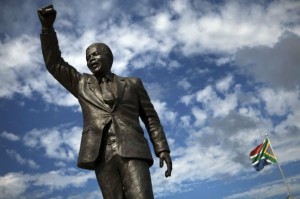
The Colossus of Rhodes
When Nelson Mandela died last week, the world did not mourn, it rejoiced that he had lived. That reaction is itself remarkable, but the breadth of it is more so. Africa, the West, the Arab world, the Subcontinent, the Far East, all cried out their thanks to him with one voice. That any man could be so loved by the world is remarkable. That it could be a revolutionary and political leader seems almost impossible.
There has probably never been a man as admired by such a range of the earth’s people as this. With over 90 heads of state attending his memorial, it will be the largest such gathering in history. (If you have any suggestion of others who have been held in similar regard, please post below).
That this is testament to the man goes without saying. It also says something about us.
That on every continent, from all religious and political and cultural world views, there could be near-unanimity in admiring one man is a beautiful thing. It shows that humanity is one, that certain feelings and ideas unite us. So what are the philosophical and personal characteristics of Mandela’s that could be so admired by the world in 2013?
Mandela toppled Rhodes. Cecil Rhodes was a giant of history, as principal embodiment of an epochal, centuries-spanning movement, of capitalist-driven colonialism empowered by racist ideology. Mandela, like Rhodes, was just one character in a story much longer than his life. But he gave that colonial movement one of its greatest last defeats. So to the world, Mandela stood against racism, against barriers between peoples, against exploitation of the world’s poor.
Whether one can separate his temperament from his world view, I can’t say. But in his character, he stood for conciliation, respect and grace. However much he fought, he was not consumed by hate. I think a large part of our respect for Mandela stems from these personal characteristics. He searched for unity between us, and we are unified in admiration of that.
We’ve lost a giant, who set a grand example of what one life, one man of flesh and bone, faults and dreams, can do, and of what values are honoured the world over.
Mandela spent almost three decades in prison, during which time he accomplished more than most free men do in a lifetime. While jailed on Robben Island, Mandela used this poem as inspiration, and to motivate fellow prisoners.
Out of the night that covers me,
Black as the pit from pole to pole,
I thank whatever gods may be
For my unconquerable soul.
In the fell clutch of circumstance
I have not winced nor cried aloud.
Under the bludgeonings of chance
My head is bloody, but unbowed.
Beyond this place of wrath and tears
Looms but the horror of the shade,
And yet the menace of the years
Finds and shall find me unafraid.
It matters not how strait the gate,
How charged with punishments the scroll,
I am the master of my fate:
I am the captain of my soul.

Leave a Reply